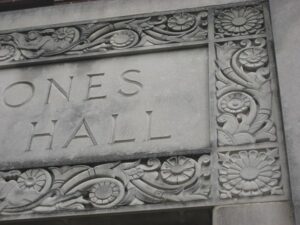I recently ran across an article about the Rhode Island legislature’s hearing on community college spending. In July, the Legislature heard testimony from the president of the Community College of Rhode Island (CCRI). CCRI is Rhode Island’s only community college. It is also the largest community college in New England, with an enrollment of about 17,000 and six campuses statewide. The legislators’ major focus is accountability, following CCRI President Meghan Hughes appearance at the hearing.
The Legislature has taken issue with Hughes’ hiring of five high-level administrators – all of whom come from out of state. According to them, Hughes did not disclose the hires during a budget presentation to the House Finance Committee. During her testimony, Hughes indicated that CCRI had frozen all non-necessary hiring. In fact, the five new hires add more than $500,000 to CCRI’s annual budget, when figuring in salaries and benefits costs.
In the past, legislators have not required department heads or college presidents to testify under oath. Following Hughes’ testimony, however, that may change. Lawmakers believe Hughes misled them by not answering their questions fully, or by directing them away from spending issues at CCRI.
Rhode Island’s community college system is different than the one we have here. Noticeably, the State plays a much larger role in college governance. But the episode brings up a point. The legislators were upset by the hiring of five high-level administrators, all of whom were deans, directors or program managers. The legislature asked pointed questions of the president, and felt deceived when they discovered that Hughes had not been completely forthright in her responses.
When the trustees don’t demand accountability, we don’t get accountability
The State of Rhode Island relies on the Legislature to provide financial oversight of its community college. The State of Michigan and the Washtenaw County taxpayers expect the WCC Trustees to provide the same kind of pointed oversight. We rely on our elected trustees to ask hard questions and to reject poor spending decisions – such as the hiring of five high-level administrators.
As a group, Washtenaw County taxpayers, the State of Michigan and WCC students pay for almost all of WCC’s operations. Collectively, we have one shot at accountability for the tens of millions of dollars we provide annually to fund WCC. We have fully invested that one shot in the Board of Trustees. So when the Board of Trustees fails to:
- Ask a single credible question about major expenditures
- Demand accountability from the President (and her ten Vice Presidents and more than 40 deans and directors)
- Reject the President’s incessant requests to hire more administrators
- Demand that the President properly care for the infrastructure on campus
- Ask questions about why such a well-funded community college has a structural deficit
They fail all of us – the taxpayers, the State of Michigan and the students. We have a right to authentic accountability and the Trustees are supposed to provide it. They’ve been put into office for one reason – to watch the money.
Our money.
Instead, we have a group of people with a perverse notion of their responsibilities to the community and the State of Michigan. For some reason, they believe themselves to be “advisors” to the President. Inexplicably, they have conned themselves into believing that they were elected to “support” the President. They are sound asleep.
In other words, no one is watching the money.
Photo Credit: Kevin Dooley , via Flickr










































